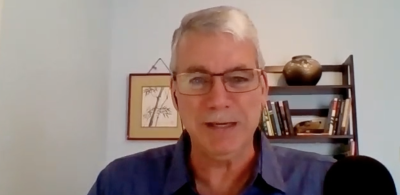Churches should avoid 'purity conversations' when warning kids about porn, consultant advises

An expert who works to equip churches and organizations in the fight against pornography advised church leaders Saturday to avoid preaching about purity when addressing porn addiction among teens in their congregations.
Rob Stoddard, a church consultant for the pornography screen accountability company Covenant Eyes, spoke with church leaders on day two of the “Porn, Shame & the Christian Teen” summit hosted by Axis and Covenant Eyes that began last week and ran through Tuesday.

“The majority of children and teens have already been exposed to pornography or are addicted to pornography,” Stoddard, former church lay leader and missionary to Asia, said.
Talking with teens about not viewing porn when they have potentially already been exposed to it could be harmful, he added.
Taking a purity-based narrative with youth, he said, assumes they have not been exposed to pornography, and this can potentially lead kids to hide their pornography addictions.
“When we have that purity conversation, we really are just pushing those children who have struggled or are struggling with [porn addictions] further away or probably deeper and deeper into secrecy because they will possibly feel like they are unworthy or they have already blown it and that they can’t now measure up to that level of purity,” Stoddard detailed.
“Having those conversations that are real … talking about that exposure, that’s certainly where transparency and honesty can go a long way. … It’s a good thing to tell [youth] we understand that struggle, and we’ve been through that struggle because probably a lot of us went through it as teenagers.”
Although most statistics state the average age of a child's first exposure to pornography is around 11 years old, research from the security technology company Bitdefender has reported children under the age of 10 account for 22% of online porn consumption under 18.
Stoddard advised that it might be helpful for church leaders to start the conversation about exposure to pornography, but they should also allow teens and children to talk and share their experiences with peers.
“Accountability and peer-to-peer conversations can lead to them opening up so much more,” he said. “This allows for them to get in the habit of being transparent and open and honest with an accountability partner.”
For many churches, preaching about pornography addictions in the pulpit typically only involves pastors addressing the issue as if it’s only a “male issue,” Stoddard added. However, he said isolation and loneliness because of porn has multiplied for women.
Statistics suggest that up to 33% of women under 25 and 25% of married women say they watch porn at least once a month.
“Women sit there and think, ‘Am I the only one that’s struggling with this?’ ... And women are also thinking, ‘Oh gosh, am I struggling with a men’s problem here? What’s wrong with me?’” Stoddard said. “When we talk about the issues of pornography and purity, we have to always talk about men and women who are struggling and not just say men or addressing [only] men. I’ve heard many women say, when the church decides to acknowledge struggle, it goes a long way.”
Because most churches are run by male leaders, Stoddard explained, they should aim to address pornography addiction among women by setting up specific mechanisms that can create safer environments for women to start having conversations on the topic.
“Women are typically not going to come forward to a male staff and start this conversation about this, so [church leaders] need to make sure they have other avenues that women can go to [to allow] them to know they can go talk to another woman and begin to have this conversation,” he said. “Bring in speakers who have dealt with this and that have testimony and can start to talk with women and get that conversation going. Have the resources ready.”
“For the most part, the Church is just silent on the fact that women are struggling, and it’s skyrocketing. And If we don’t address it, we are really going to have a problem,” he continued. “There’s already a problem. … This is a big need in the Church for sure.”
Karen Potter, Covenant Eyes’ ministry outreach director, also spoke at the conference and shared how she has used her experiences raising children to help equip other adults to discuss the topic of pornography addiction with their kids.
“My children just kind of made it through that high school season, and we did not make it out unscathed,” Potter, a mother of two college-aged children, described.

“And now, I have a passion to help other parents learn and grow together, and my work here at Covenant Eyes has given me some tools and resources that I can share with other people. We are in a battle. … Our culture is attacking our kids and we’ve got to be equipped with the tools and resources we need to go to war against culture and to protect our families.”
Throughout her time working with Covenant Eyes, Potter said she has held many discussions and presentations for church and ministry leaders all over the country. She said from these discussions she has learned that “we are all broken in some way, shape or form.”
“We all have a sexual brokenness about us because of the culture we have been raised in,” Potter said. “I think it’s a little naive for anyone to think that we come to the table not equipped. Actually, our life experiences equip us to do this work. God gives us those experiences to use to help nurture and to educate our children.”
Many times, Potter said, she has worked with parents that do not think they can help their children because they are struggling with pornography addiction themselves. In these cases, she advises parents to overcome their fears, shame and guilt and “do what is right” and what God is calling them to do.
“God called us to train up our children in the way they should go and we have to just step out in faith that God will give us the tools and the resources and the programs that we need to have these conversations with our kids,” she added during her conference presentation. “This starts in the Church. We as adults need to connect with one another and we need to let each other know we are in this together and be cheerleaders for one another because it’s not easy.”
Potter said parents should allow Covenant Eyes and Axis to be parts of their children’s life experiences because both can help them understand how pornography is “invading” their spaces.
“Music culture, TV, movies are all almost like the gateway drug to pornography,” she said. “Every child is online nowadays, and they are one click away from accidentally stumbling upon something that they shouldn’t.”
Parents should understand that pornography is available in many different forms.
“It’s all around our children. So to pretend and think that we can just put them in bubble wrap and keep them away from it is not a good strategy,” Potter concluded. “We need to be honest and we need to understand and we need to prepare them to take pornography head-on because it’s going to come after them, and they got to know what to do. Get them surrounded by tools and resources … not just for protecting them, but for preparing them.”



























